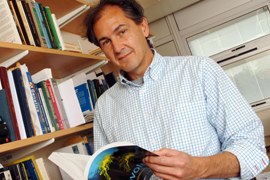Human innovation more trial-and-error than 'lightbulb' moments
Release Date 14 September 2015
Humans are not as good as coming up with sudden ‘game-changing' new ideas as was previously thought, a new University of Reading study suggests.
Instead, human innovation comes more from steady improvements through trial and error, found researchers, who made the findings after studying the speed at which Bantu-speaking farmers in Africa migrated across the continent 5,000 years ago.
The researchers used information on current communities and a sophisticated language family tree to discover that the Bantu ‘stuck to what they knew', following savannah environments familiar to them and largely avoiding the alien Congo rainforest.
Surprisingly, when they did move into the rainforest, rates of migration were slowed by as much as 300 years. This reflects the time it took them to develop new technologies and knowledge to master their new environment.
The research suggests that innovation is harder for humans than previously thought. It also reinforces current thinking (link) which suggests innovation has less to do with ‘thinking hard until the right solution comes to mind', but rather the slow accumulation of knowledge and technology passed down through generations.
Mark Pagel, Professor of Evolutionary Biology at the University of Reading, led the study.
He said: "Sweeping out of West Central Africa more than 5,000 years ago the Bantu migration was one of the most influential cultural events of its kind. Disease, changes in climate and an increase in population meant it spread over a vast geographical area, eventually moving all the way down to the southern tip of the African continent.
Despite humans having an unmatched cultural potential for innovation, we perhaps underestimate how difficult developing life-changing new technologies actually is -- Professor Mark Pagel
"But despite being modern humans with the intelligence and skills to adapt, the Bantu seemed to choose routes that kept them in familiar environments. Exploring exactly how this happened provides crucial evidence of how humans go about developing ideas and new technologies."
Professor Pagel and his team reconstructed the probable migration routes of over 400 Bantu-language groups. It showed that far from engaging in random walks, the Bantu followed savannah corridors for ease of movement and relocation.
Professor Pagel continued: "Crucially, our findings fit with archaeological evidence. The research demonstrates that despite humans having an unmatched cultural potential for innovation, we perhaps underestimate how difficult developing life-changing new technologies actually is.
"From Watt's steam engine design to Edison's lightbulb, history is replete with the ‘genius' inventor. But those amazing feats were not developed in a ‘Eureka moment'. Watt's engine was more a redesign more than an invention. Edison's notebook reveals that he tried thousands of filament materials before alighting by chance on his favoured material.
"Very little has changed. Even today, science and business rely on groups pooling their knowledge and skills, and even then many groups cannot compete. Innovation is hard even for the most intelligent species on Earth."
Bantu expansion shows that habitat alters the route and pace of human dispersals is published today in the Proceedings of the National Academy of Sciences (PNAS).
